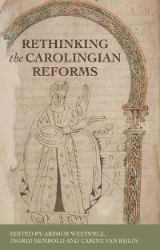Details

Rethinking the Carolingian reforms
|
144,99 € |
|
| Verlag: | Manchester University Press |
| Format: | EPUB |
| Veröffentl.: | 25.04.2023 |
| ISBN/EAN: | 9781526149541 |
| Sprache: | englisch |
| Anzahl Seiten: | 296 |
DRM-geschütztes eBook, Sie benötigen z.B. Adobe Digital Editions und eine Adobe ID zum Lesen.
Beschreibungen
<p>The Carolingian period (<i>c</i>. 750-900) has traditionally been described as one of ‘reform’ or ‘renaissance’, where cultural and intellectual changes were imposed from above in a programme of <i>correctio</i>. This view leans heavily on prescriptive texts issued by kings and their entourages, foregrounding royal initiative and the cultural products of a small intellectual elite. However, attention to understudied texts and manuscripts of the period reveals a vibrant striving for moral improvement and positive change at all levels of society. This expressed itself in a variety of ways for different individuals and communities, whose personal relationships could be just as influential as top-down prescription. The often anonymous creators and copyists in a huge range of centres emerge as active participants in shaping and re-shaping the ideals of their world.<br><br> A much more dynamic picture of Carolingian culture emerges when we widen our perspective to include sources from beyond royal circles and intellectual elites. This book reveals that the Carolingian age did not witness a coherent programme of reform, nor one distinct to this period and dependent exclusively on the strength of royal power. Rather, it formed a particularly intense, well-funded and creative chapter in the much longer history of moral improvement for the sake of collective salvation.</p>
This book sets out to challenge current interpretations of Carolingian culture, and especially its perceived correctio (correction), reform or renaissance. When we consider authors who operated outside the direct sphere of influence of the court, a much more dynamic image of Carolingian culture comes into view.
<p>Introduction: rethinking the Carolingian reforms – Carine van Rhijn<br>1 Gender and horizontal networks in Carolingian monasticisms (up to c. 840) – Ingrid Rembold<br>2 Analysing Attigny: contextualising Chrodegang of Metz’s influence on the life of canons – Stephen Ling<br>3 A Carolingian ‘reform of education’? The reception of Alcuin’s pedagogy – Cinzia Grifoni and Giorgia Vocino <br>4 Correcting the liturgy and sacred language – Els Rose and Arthur Westwell<br>5 Error assessment: how to distinguish between true and false? – Irene van Renswoude<br>6 <i>Reformatio </i>and <i>correctio</i> in Carolingian theology and orthodoxy: reformation or <i>aggiornamento</i>? – Kristina Mitalaité<br><i>Index</i></p>
<p>Arthur Westwell is wissenschaftlicher Mitarbeiter at the Universität Regensburg<br><br>Ingrid Rembold is a Lecturer in Medieval History at the University of Manchester<br><br>Carine van Rhijn is a Lecturer in Medieval History at Utrecht University</p>
<p>The Carolingian period (<i>c</i>. 750–900) has traditionally been described as one of ‘reform’ or ‘renaissance’, where cultural and intellectual changes were imposed from above in a programme of <i>correctio</i>. This view leans heavily on prescriptive texts issued by kings and their entourages, foregrounding royal initiative and the cultural products of a small intellectual elite. However, attention to understudied texts and manuscripts of the period reveals a vibrant striving for moral improvement and positive change at all levels of society. This expressed itself in a variety of ways for different individuals and communities, whose personal relationships could be just as influential as top-down prescription. The often anonymous creators and copyists in a huge range of centres emerge as active participants in shaping and re-shaping the ideals of their world.<br><br> A much more dynamic picture of Carolingian culture emerges when we widen our perspective to include sources from beyond royal circles and intellectual elites. This book reveals that the Carolingian age did not witness a coherent programme of reform, nor one distinct to this period and dependent exclusively on the strength of royal power. Rather, it formed a particularly intense, well-funded and creative chapter in the much longer history of moral improvement for the sake of collective salvation.</p>

















